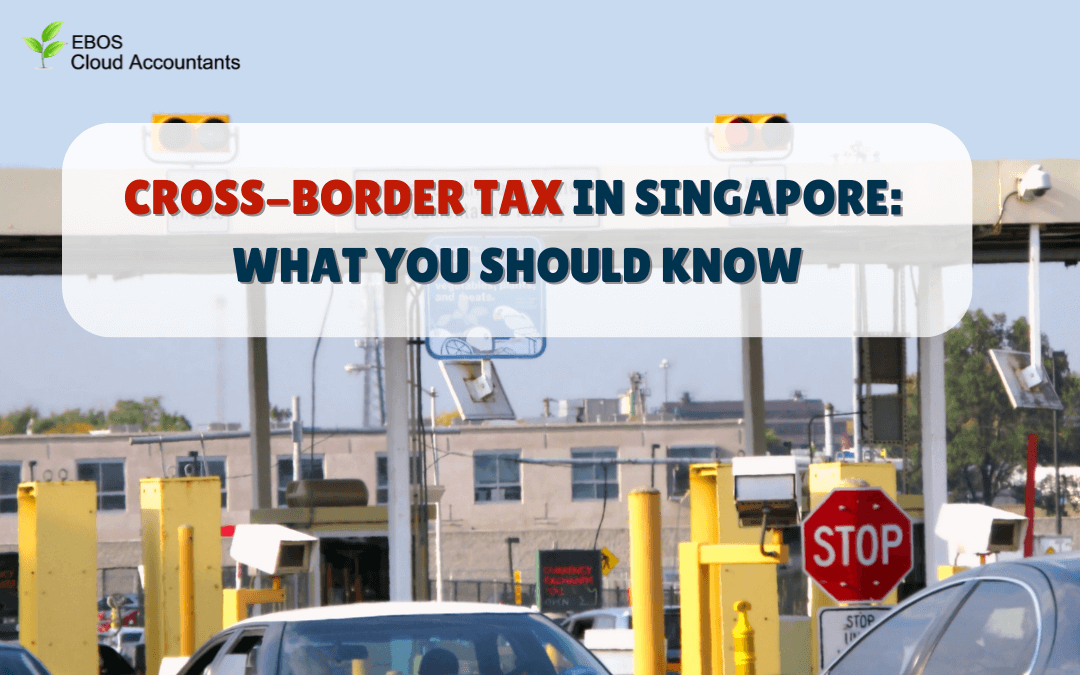Singapore is a prime hub for regional and international business, attracting entrepreneurs, investors, and companies from all over the world. But when your business activities, income, or customers span across borders, tax matters can quickly get complicated.
Understanding cross-border tax rules is critical — not just to stay compliant with IRAS (Inland Revenue Authority of Singapore), but also to avoid double taxation, penalties, or missed tax-saving opportunities.
Here’s a clear breakdown of what you need to know about cross-border taxation in Singapore:
1. Singapore’s Territorial Tax System
One key benefit for international businesses: Singapore adopts a territorial basis of taxation. That means:
-
Only income accrued in or derived from Singapore is taxable.
-
Foreign-sourced income is generally not taxed unless it’s received in Singapore.
So if you earn overseas income and keep it offshore, it might not be taxed in Singapore — but there are important exceptions (see below).
✅ Example: You run a Singapore-based company but earn revenue from clients in Europe. That income is taxable in Singapore.
🚫 But if your foreign investment income stays overseas and isn’t brought into Singapore, it may be tax-exempt.
2. Foreign-Sourced Income Received in Singapore
If your foreign income is received in Singapore, it may be taxable, unless it meets exemption conditions under Section 13(8) of the Income Tax Act.
To qualify for exemption, your foreign income must:
-
Be subject to tax in the foreign country (even if at a low rate),
-
Not be received through a tax haven,
-
Have been properly declared.
✅ Tip: Maintain documentation showing foreign tax paid, bank transfers, and supporting invoices.
3. Double Tax Agreements (DTAs)
Singapore has signed over 90 Double Tax Agreements to avoid double taxation on cross-border income like dividends, interest, royalties, and business profits.
If you have income taxed both overseas and in Singapore, a DTA may:
-
Exempt one of the tax liabilities,
-
Offer withholding tax relief, or
-
Allow for tax credits on the amount paid overseas.
✅ Example: You earn royalties from Malaysia. You may be taxed there, but Singapore can grant a credit to offset that tax — avoiding double taxation.
4. Withholding Tax for Payments to Non-Residents
If your Singapore company pays a foreign party (e.g., overseas consultants, licensors, or directors), you may need to withhold tax before remitting payment.
Common scenarios include:
-
10% tax on royalties paid to a foreign company
-
15% tax on interest paid to non-residents
-
15% tax on service fees (if considered sourced in Singapore)
💡Always check DTA terms, as they may reduce the withholding tax rate.
5. Permanent Establishment (PE) Risk
If you’re a foreign business with operations or agents in Singapore, you may be seen as having a Permanent Establishment — and be taxable on income earned here.
Examples of activities that may create a PE:
-
Setting up a branch office
-
Appointing a dependent sales agent
-
Providing services in Singapore for an extended period
✅ Pro tip: Use clear contracts and documentation to distinguish between limited presence and a taxable establishment.
6. Transfer Pricing Compliance
If your Singapore entity deals with related parties overseas — e.g., intercompany loans, service charges, or goods sold — transfer pricing rules apply.
IRAS requires:
-
Transactions to be at arm’s length,
-
Proper transfer pricing documentation,
-
Disclosures in your tax filing.
Failing to comply can lead to penalties or tax adjustments.
7. Cross-Border Tax Planning Opportunities
Smart structuring of your business can help reduce your tax burden while staying compliant. This includes:
-
Choosing the right entity structure (subsidiary vs branch),
-
Timing of income repatriation,
-
Making use of DTAs and tax incentives (e.g., for HQs or trading firms),
-
Utilizing IRAS-approved cloud accounting for compliance and documentation.
Final Thoughts
Cross-border tax in Singapore doesn’t have to be a maze — but it does require planning and precision. Whether you’re operating across ASEAN, the US, or beyond, it pays to understand Singapore’s tax rules, DTAs, and reporting obligations.
When in doubt, consult a qualified tax advisor — especially if you’re dealing with multiple jurisdictions, intercompany arrangements, or foreign withholding tax.
After all, the cost of a mistake could far outweigh the cost of getting it right. Check out our website at https://ebos-sg.com/ to explore more articles and discover how our Cloud Accountant Services can support you on your business.







